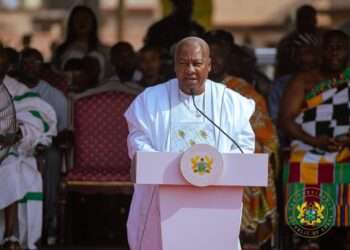The Dean of the School of Business of the University of Cape Coast (UCC), Professor John Gatsi has shared his insights on Ghana’s economic policies and raised critical points on the effects of small-scale gold exports, the impact of policies introduced by the Bank of Ghana, and the implications of scrapping certain taxes, such as the betting tax and the e-levy.
Professor John Gatsi’s insights shed light on the nuanced and complex issues that need to be addressed for sustainable economic growth.
On Small-Scale Gold Exports and Bank of Ghana’s Involvement, Professor Gatsi began by examining the gold export sector, specifically focusing on small-scale mining and its interplay with the Bank of Ghana’s gold purchasing activities. Professor John Gatsi emphasized the potential repercussions of these activities on small-scale miners.
“How much gold is small-scale miners exporting? In the face of the gold purchased by the Bank of Ghana, in the upscaling of the gold pitches by the Bank of Ghana, I believe it will do something to them.”
Professor John Gatsi Dean of the School of Business of the University of Cape Coast (UCC)
Professor Gatsi raised concerns about whether the current policies, especially those involving withholding taxes, were designed to benefit small-scale miners or merely served the interests of larger entities.
While acknowledging that a smaller withholding tax might be advantageous for exporters, Gatsi questioned the broader impact:
“If the withholding tax is small, that is good for the exporters. But what is the effect? The policymakers introducing these measures have not clearly articulated what long-term benefits these policies will bring to the country.”
Professor John Gatsi Dean of the School of Business of the University of Cape Coast (UCC)
Professor Gatsi also highlighted the ongoing issue of gold smuggling, noting that the current policies might not adequately address this problem. He remarked, “There are many factors that go into curbing smuggling, and those factors, when they are not activated with some incentive across the borders, they will still engage in smuggling. So, we need to look at all that holistically.”
Scrapping of Betting Tax and E-Levy: A Critical Evaluation
Professor Gatsi highlighted on the recent proposals by the opposition party, the NPP, which promised to scrap certain taxes if elected, particularly the betting tax and the e-levy. His concerns were centered on the potential revenue loss to the government and the lack of a clear plan to compensate for this loss.
Professor John Gatsi urged the proponents of these tax cuts to provide a clear strategy on how they would offset the potential revenue losses. Professor John Gatsi emphasized that those who are proposing that e-levy was the solution to every problem, and they brought it, now being enhanced, are saying they will take it off. They are the ones who should tell us how they are going to create another conduit for revenue to fill that gap.
Long-term Implications and the Bigger Picture
Delving deeper into the implications of removing the betting tax, Professor Gatsi pointed out the need for a balanced perspective. He suggested that while there is a financial aspect to consider, the social implications should not be overlooked.
“You need to look at the betting tax from two perspectives. One perspective is, that if you are providing some tax, [are you encouraging that]? And, you also look at how it is destroying the youth. It is creating a lot of psychological problems.”
Professor John Gatsi Dean of the School of Business of the University of Cape Coast (UCC)
Moreover, Professor John Gatsi further elaborated on the negative social impact of betting on the youth, many of whom are already struggling with significant challenges.
“It is creating a lot of psychological problems, such as some youth not being able to pay school fees and the rest. So, you need to match that against the revenue that you are getting.”
Professor John Gatsi Dean of the School of Business of the University of Cape Coast (UCC)
Gatsi cautioned against focusing solely on the revenue aspects, urging a more holistic approach that considers both the economic and social implications of such policies. This he asserted: “If not, we will only focus on the revenue that is lost, and then we will be asking how we are going to fill that revenue gap.”
Professor John Gatsi’s analysis highlighted the complexities of economic policy-making in Ghana. His insights underscored the importance of considering both immediate and long-term effects, as well as the social impact of fiscal decisions.
While certain policies may provide short-term relief or benefits, Gatsi’s commentary urged policymakers to think critically about the broader implications for the country’s economic health and social well-being.





















